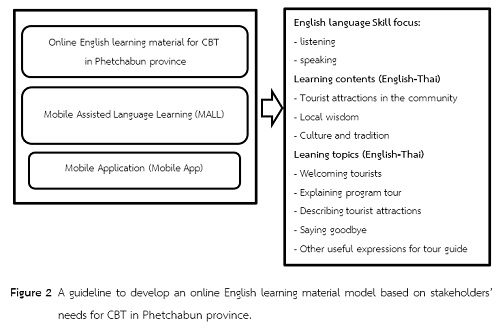THE GUIDELINES FOR ENGLISH LEARNING MEDIA DESIGN FOR COMMUNITY-BASED TOURISM (CBT) THROUGH STAKEHOLDERS’ NEEDS ANALYSIS IN PHETCHABUN PROVINCE
DOI:
https://doi.org/10.14456/nrru-rdi.2022.22Keywords:
English learning media, Community-based-tourism, Needs analysisAbstract
The English language plays an important role in communication, especially in a tourism context because many international tourists speak English. This study aims to investigate the guideline for English learning media design for community-based tourism through stakeholders’ needs analysis in Phetchabun Province. Twenty-five participants were selected by purposive sampling for a semi-structured interview with an average IOC score of 0.88. A focus group interview was also used to analyze their English language needs for designing English learning media for CBT. The data were analyzed employing content analysis. There were two key results on needs, including the need for English content in learning media for CBT and the need for English learning media style for CBT stakeholders. These stakeholders believed strongly in the need for English content for a tour guide in CBT by focusing on tourist attractions, local wisdom, and community traditions. They mainly needed to use the English language for welcoming tourists, explaining program tours, describing tourist attractions, saying goodbye, and other useful expressions for tourist guides by focusing on training for students in the community. Additionally, in the COVID-19 situation, they required an online English learning media for listening and speaking skills and needed to practice the English language with native speakers via online learning which focused on vocabulary, useful expressions, and long conversations that they may learn or practice by themselves.
References
Belcher, D. (2006). English for specific purposes: teaching to perceived needs and imagined futures in worlds of work, study, and everyday life. TESOL Quarterly, 40(1), 133-156.
Brown, J. D. (1995). The elements of language curriculum: A systematic approach to program development. Boston : Heinle and Heinle.
Brown, J. D. (2016). Needs Analysis and English for Specific Purposes. London : Routledge.
CBT entrepreneur in Ban Huay Prong. (2021). Interview. (In Thai)
Charoenkongka, A., & Nomnian S. (2019). Needs Analysis of Communicative English through Community-Based Tourism: A Case Study of Koh Klang Community in Krabi Province. Journal of International Studies, Prince of Songkla University, 9(2), 211-232. (In Thai)
Chen, P. C., Chiu, W. Y., & Lin, T. Y. (2011). A study constructing holistic English for specific purposes (ESP) curriculum model for tourism and hospitality English. Education Research Journal, 1(5), 84-93.
Dudley-Evans, T., St John, M. J., & Saint John, M. J. (1998). Developments in English for specific purposes: A multi-disciplinary approach. Cambridge : Cambridge university press.
Head of CBT in Ban Huay Prong. (2021). Interview. (In Thai)
Hsu, L. W. (2010). Learning gaming English by prospective casino dealers in Taiwan: An explorative study. Journal of Foreign Language Instruction, 4(1), 69-86.
Hutchinson, T., & Waters, A. (1987). English for Specific Purposes. Cambridge : Cambridge University Press.
Kuppan, A. (2008). An evaluation of an English course for hospitality management in a tertiary institution. Dissertation, Master of English as a Second Language Program in Faculty of Languages and Linguistics, University of Malaya Kuala Lumpur, Malaysia.
Leslie, D., & Russell, H. (2006). The importance of foreign language skills in the tourism sector: A comparative study of student perceptions in the UK and continental Europe. Tourism Management, 27(6), 1397-1407. https://doi.org/10.1016/j.tourman.2005.12.016
Manager Online. (2019). “Ban Huay Prong” community tour, visiting Thai Lom weaving style and the historic town of Muang Rad, Pho Khun Pha Muang. Retrieved January 20, 2020, from https://mgronline.com/travel/detail /9620000057800 (In Thai)
Minodora Otilia, S. (2015), NEEDS ANALYSIS IN ENGLISH FOR SPECIFIC PURPOSES, Annals-Economy Series, 1(II), 54-55.
Nitikasetsoontorn, S. (2015). The Success Factors of Community-Based Tourism in Thailand. NIDA Development Journal, 55(2), 24-58. (In Thai)
Nomnian, S. (2014). Thai Entrepreneurs’ Needs of English Language for Raft Service Business. Silpakorn University Journal of Social Sciences, Humanities, and Arts, 14(3), 101-128. (In Thai)
Nomnian, S., Trupp, A., Niyomthong, W., Tangcharoensathaporn, P., & Charoenkonka, A. (2020). Language and community-based tourism: Use, needs, dependency, and limitations. Austrian Journal of South-East Asian Studies, 13(1), 57-79.
Prachanant, N. (2012). Needs analysis on English language use in the tourism industry. Procedia-Social and Behavioral Sciences, 66(7), 117-125.
Satarat, N. (2010). Sustainable management of community-based tourism in Thailand. Dissertation, Doctor of Philosophy Program in Development Administration, School of Public Administration, National Institute of Development Administration, Bangkok. Retrieved January 20, 2020, from http://libdcms.nida.ac.th/thesis6/2010/b166706.pdf (In Thai)
School director of Pho Khun Pha Mueang Uppatham School. (2021). Interview. (In Thai)
Suansri, P., & Yeejaw-haw, S. (2013). Community-based tourism (CBT) standard handbook. Bangkok : Wanida Karnpim Limited Partnership. (In Thai)
The National Tourism Policy Committee. (2017). National Tourism Development Plan No.2 (2017-2020). Retrieved January 20, 2020, from https://www.mots.go.th/ewtadmin/ewt/mots_web57/ download/article/article_20170320150102.pdf (In Thai)
The student of Pho Khun Pha Mueang Uppatham School. (2021). Focus group interview. (In Thai)
The teacher of Pho Khun Pha Mueang Uppatham School. (2018). Focus group interview. (In Thai)
The villager in Ban Huay Prong community. (2021). Interview. (In Thai)

Downloads
Published
How to Cite
Issue
Section
License

This work is licensed under a Creative Commons Attribution-NonCommercial-NoDerivatives 4.0 International License.




